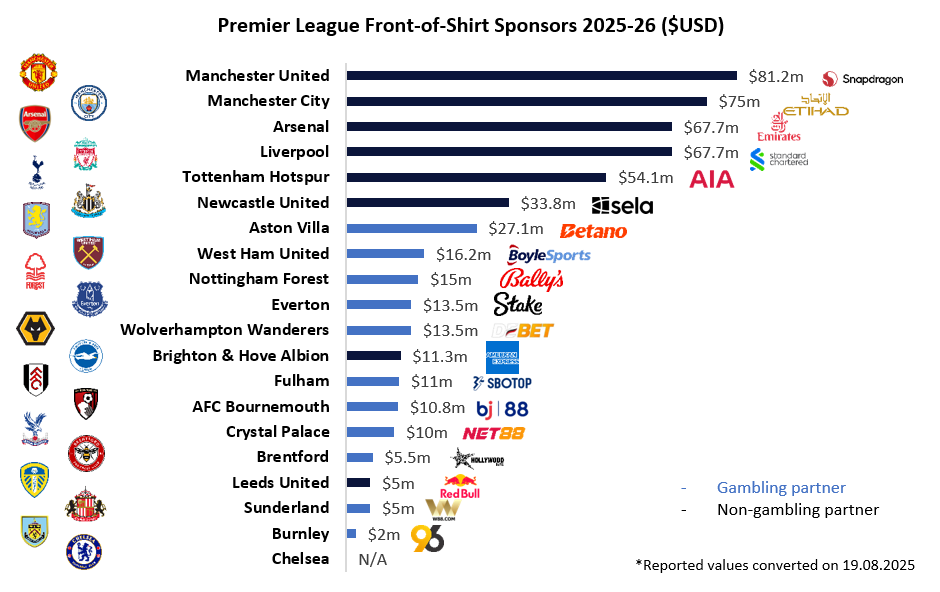
The gambling market has been the dominant industry of Premier League front-of-shirt sponsorship deals in recent seasons. In April 2023, the Premier League announced that it would ban gambling sponsorship on the front of matchday shirts, following a ban that has been growing in prominence across Europe.
These bans have been in place in Italy (Serie A) since the 2019-20 season, and in Spain (LaLiga) since the 2021-22 season. Reasons for the bans across European soccer relate to the negative connotations of the gambling industry, including links to addiction and its prominent branding, somewhat normalizing a vice to children watching.
The Premier League experienced a similar shift with the alcoholic beverage industry’s involvement on shirts, which had similar negative links to addiction and negative promotion to under-18s, although an industry-wide ban on shirt partnerships was not introduced. Alcoholic beverage brands have not been seen on the front of Premier League clubs’ shirts since the end of the 2017-18 season, following the conclusion of Everton’s deal with Chang Beer.
For the 2025-26 season, the Premier League front-of-shirt market is worth $525.4 million. Gambling brands account for $129.6 million of this annual revenue. Much of the affiliation to the gambling sponsorship falls outside the ‘bigger’ teams in the league.
Those classed within the ‘big six’ – Arsenal, Chelsea, Liverpool, Manchester City, Manchester United, and Tottenham Hotspur all generate tens of millions a season without the help of the gambling market because of their wider commercial appeal and significant global interest – although Chelsea are currently without an official shirt sponsor at the start of the season.
Away from the ‘big six’, Premier League teams have in recent seasons turned to the gambling market for its biggest sponsorship inventory because of its links to higher value offered. Global gambling brands want the exposure the Premier League can offer, and because of its negative affiliation, have offered larger agreements to alleviate club concerns.

US Tariffs are shifting - will you react or anticipate?
Don’t let policy changes catch you off guard. Stay proactive with real-time data and expert analysis.
By GlobalDataThe value from the front-of-shirt market in the Premier League is dominated by the deals involved in the ‘big six’, which will generate $345.7 million this season. This, however, means that gambling brands cover 78.6% of the rest of the league in terms of deal volume. Furthermore, its combined annual value covers 72.1% of the market outside of the ‘big six’.
Only three teams outside of the ‘big six’ boast non-gambling brand sponsors on their shirts this season – Brighton & Hove Albion, Leeds United, and Newcastle United. Strong financial alternatives and wider rights for these three clubs are reasons why they remain clear of the gambling market.
Brighton maintain a long-term partnership with American Express, which also covers naming rights to the team’s home stadium. Meanwhile, the roots of the partnerships for Leeds United and Newcastle United, with Red Bull and Sela, respectively, are tied to the club’s ownership structure. All of this highlights the importance and influence of the gambling market on front-of-shirt rights in the Premier League ahead of its incoming ban.

The reality is that Premier League teams, even less than 12 months before a ban, can not resist the higher sums on offer from the gambling industry. The front-of-shirt inventory remains one of the biggest partnerships a club can offer, and as such, want to maximize the revenue it can generate.
The interest in more revenue at a quicker rate is evidenced by three new deals in the league ahead of the 2025-26 season for Nottingham Forest, Sunderland, and West Ham United. All three have turned to the gambling industry and signed a single-season partnership with Bally’s, W88, and BoyleSports, respectively.
Given its high prominence, the incoming ban on gambling front-of-shirt partnerships will impact most of the Premier League. Teams will be speaking with prospective new brands over the next 12 months to secure future partnerships away from the gambling market.
The global coverage and strong commercial landscape of the Premier League mean teams should not struggle to find replacements, but without the gambling industry, many will be forced to accept smaller partnership fees. These partnerships will still generate millions in revenue for each club, but any likely reduction could have a consequential effect on its business operations moving forward, particularly when it comes to appeasing Financial Fair Play rules and regulations.
Given how the gambling partnership ban only relates to the front-of-shirt taxonomy, however, clubs will likely continue to lean on the industry for other major sponsorship rights it has to offer, thus boosting its revenue elsewhere. One such area of interest will likely be the sleeve market, which has become a lucrative source of revenue since it was permitted in the league at the start of the 2017-18 season.
As for the front-of-shirt space, the market will likely be less dominated by one industry moving forward, as clubs forge a new direction of partnership. Industries that will likely look to fill the void include the financial services, technology, and travel & tourism sectors.
All three are linked to big sports sponsorship rights around the world, including with ‘big six’ clubs this season. They regularly feature as some of the most active industries in the market and boast operations that could truly benefit from the global appeal of the Premier League.
Although its bubble initially burst after an overwhelming hype a few years ago, the cryptocurrency market could also still be a viable option for Premier League clubs looking to negotiate new shirt partners.
Although less prominent in sports sponsorship’s biggest rights, the crypto market has not fallen into complete non-existence; it is a more stable market now and maintains high-value sports sponsorship deals such as Crypto.com’s partnerships with UEFA and the LA Lakers’ home stadium naming rights, valued at $75 million and $35 million a year each.
Furthermore, there has been evidence of the industry’s involvement with Premier League team rights in recent seasons, such as Manchester United’s training kit deal with Tezos (2022-2025) and Tottenham Hotspur’s sleeve deal with Kraken (2024-present).





